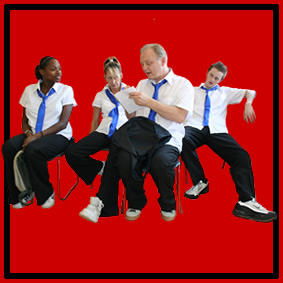drugs and
substance abuse
relationships and
domestic violence
knife crime
teenage pregnancy
and sexual health
consequences of
offending
skills for independent living
restorative
justice
bullying and emotional literacy
primary to
secondary
transition
alcohol misuse
exploring diversity and community cohesion
|
SNAPPED
Bullying and Intimidation
Snapped was launched in London in 2010, as a result of repeated requests from schools for a bullying specific programme. Bullying and intimidating behaviour continues to be one of the key threats to the emotional health and well -being of young people.
In June 2010, a report by the charity Beatbullying stated that 44% of suicides amongst 10-14 year olds, that were reported in the national media, were linked to bullying and intimidating behaviour.
According to research conducted by the NSPCC; 31% of children experienced bullying by their peers; children who are abused or neglected by their parents were consistently more likely to experience bullying, discrimination or being made to feel different by their peers; a quarter of children bullied by their peers reported that they suffered long term harmful effects lasting into adulthood.
Target audience
Snapped is suitable for young people in Mainstream Education aged 10 to 14. The programme can also be adapted for more specialist audiences within SEN education and Short Stay Schools. The programme would also be suitable for Conference and Training events.
Objectives
- To define bullying in all its forms (from name-calling to cyber-bullying). When does simple 'banter' or teasing become bullying?
- To look at the feelings and emotions around bullying. How does smeone who is being bullied feel?
- To explore why some individuals might bully others.
- To explore and challenge the mentality and role of the bystander, as well as those who actively support, or join in with the bullying. What makes people act in this way or fail to intervene?
- To create a safe environment where practical solutions can be explored.
- To promote a non-violent, non-confrontational community response to bullying.
The play
The play tells the story of Levi and follows how simple teasing and banter with his friends leads him to increasingly feel isolated, undermined and victimised. The situation escalates as the teasing and taunts become increasingly sinister and hostile, leading to confrontation and ultimately violence. Matters are made worse when an act of violent and demeaning bullying is captured on a mobile phone and later 'bluetoothed' around the school.
The workshop
The workshop examines the behaviour and actions of each of the characters in order to explore the mechanisms that lead to, and allowed the escalation of the bullying. What could people have done differently to stop the progression of events? Did things escalate before people realised the impact they were having on Levi? Did people fail to intervene or support Levi when it was clear he was being bullied? If so, why was this?
Throughout, participants are given the opportunity to interact with the characters , to explore why they behaved as they did and what they were thinking and feeling at the time. Ultimately, volunteers are invieted to role play and Forum key moments from the play and attempt to affect a different outcome for Levi, either through his actions alone, or through the support, intervention and mediation of his freinds and peers.
|
|





